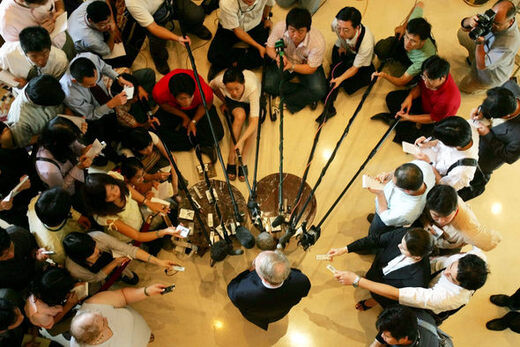hankyoreh
Links to other country sites 다른 나라 사이트 링크
[News Analysis] Why is North Korea so stubborn?

As North Korea and the U.S. have consistently maintained their divergent positions on the missile issue, the problem is entering a new phase. Since China has taken a step backward from its position ’protective’ of North Korea, the UN Security Council will likely to adopt a resolution against North Korea and the U.S. and Japan are expected to strengthen demands for sanctions against the communist regime. It is clear that the option of diplomatic pressure is gaining momentum.
Despite Beijing’s persuasion, Pyongyang has insisted on its stance. Some say it is because the North did not get expected concessions from Washington after the missile tests. The North has requested the U.S. to lift financial sanctions and for Assistant Secretary of State Christopher Hill to visit Pyongyang, but Washington has consistently rejected Pyongyang’s demands.
Chinese Foreign Ministry spokesperson Liu Jianchao urged the U.S. to take measures for a quick resumption of the six-party talks on North Korea’s nuclear program by lifting the economic sanctions against North Korea. Hill, who was visiting Beijing, however, immediately replied that the purpose of financial sanctions against the North is to prevent capital from being used for military purposes by North Korea. The U.S. has only continued to repeat its message that if the North returns to the negotiating table, all problems will be discussed within direct North Korea-U.S. talks.
According to an official, the North thinks that after the missile launches, the situation, including the discussion of a UN Security Council resolution, has not gotten worse as it had anticipated. In connection with the security council issue, China and Russia, two allies of North Korea, are split with Japan and the U.S. over whether to include detailed sanctions based on Chapter VII of the UN Charter or not. Even the U.S. and Japan are showing differences in their positions. Pyongyang seems to calculate that Washington, which is now entirely preoccupied with Iran over its nuclear activities, will not press it so hard.
China’s moves have two facets. Regarding discussion at the UN Security Council, China submitted a resolution with Russia on July 12, at a more serious level than the existing Chairman’s Statement against North Korea but without concrete discussion of sanctions. Such a move can be interpreted as an ’offensive defense,’ meaning that China drafted the document because it will never accept a resolution that includes sanctions against North Korea. In the meantime, Beijing is putting pressure on Pyongyang to get a promise to come back to the six-nation talks. Chinese Vice Foreign Minister Wu Dawei, who is visiting Pyongyang, reported back to Beijing that talks with the North were not going smoothly. Still, Wu continues to make efforts to persuade the North.
In contrast, the U.S. side appreciates China’s efforts while criticizing North Korea as uncooperative. Before leaving Beijing, Assistant Secretary Hill blamed the North of not listening to China’s advice while still accepting assistance from them.
Seoul’s voice on the matter is increasingly getting weaker. The international community has put pressure on North Korea, but the South-North dialogue channel as well as the six-party talks are not functioning properly.
The South Korean government’s Maginot Line is to maintain inter-Korea cooperative projects and at the same time tell Pyongyang that the worst-case scenario is "five-party talks" excluding the communist nation. The South’s intention is to keep the framework of the stalled six-party talks from collapsing. Concern has been raised, however, over the suggested five-party talks. A meeting without Pyongyang would create a negative effect by isolating North Korea further, some experts worry.
Editorial・opinion
![[Column] Season 2 of special prosecutor probe may be coming to Korea soon [Column] Season 2 of special prosecutor probe may be coming to Korea soon](https://flexible.img.hani.co.kr/flexible/normal/500/300/imgdb/original/2024/0426/3317141030699447.jpg) [Column] Season 2 of special prosecutor probe may be coming to Korea soon
[Column] Season 2 of special prosecutor probe may be coming to Korea soon![[Column] Park Geun-hye déjà vu in Yoon Suk-yeol [Column] Park Geun-hye déjà vu in Yoon Suk-yeol](https://flexible.img.hani.co.kr/flexible/normal/500/300/imgdb/original/2024/0424/651713945113788.jpg) [Column] Park Geun-hye déjà vu in Yoon Suk-yeol
[Column] Park Geun-hye déjà vu in Yoon Suk-yeol- [Editorial] New weight of N. Korea’s nuclear threats makes dialogue all the more urgent
- [Guest essay] The real reason Korea’s new right wants to dub Rhee a founding father
- [Column] ‘Choson’: Is it time we start referring to N. Korea in its own terms?
- [Editorial] Japan’s rewriting of history with Korea has gone too far
- [Column] The president’s questionable capacity for dialogue
- [Column] Are chaebol firms just pizza pies for families to divvy up as they please?
- [Column] Has Korea, too, crossed the Rubicon on China?
- [Correspondent’s column] In Japan’s alliance with US, echoes of its past alliances with UK
Most viewed articles
- 1The dream K-drama boyfriend stealing hearts and screens in Japan
- 2‘We must say no’: Seoul defense chief on Korean, USFK involvement in hypothetical Taiwan crisis
- 3AI is catching up with humans at a ‘shocking’ rate
- 4S. Korea “monitoring developments” after report of secret Chinese police station in Seoul
- 5[Column] Can we finally put to bed the theory that Sewol ferry crashed into a submarine?
- 6[Editorial] Yoon cries wolf of political attacks amid criticism over Tokyo summit
- 7[Photo] “Comfort woman” survivor calls on president to fulfill promises
- 8Doubts remain over whether Yoon will get his money out of trip to Japan
- 9Up-and-coming Indonesian group StarBe spills what it learned during K-pop training in Seoul
- 10[Editorial] Was justice served in acquittal of Samsung’s Lee Jae-yong?